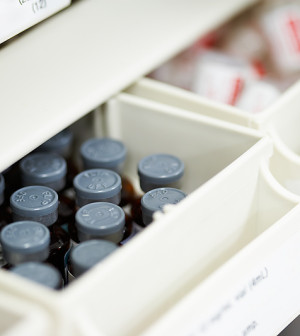- 8 Ways to Increase Dopamine Naturally
- 7 Best Breads for Maintaining Stable Blood Sugar
- Gelatin vs. Collagen: Which is Best for Skin, Nails, and Joints?
- The Long-Term Effects of Daily Turmeric Supplements on Liver Health
- Could Your Grocery Store Meat Be Causing Recurring UTIs?
- Are You Making This Expensive Thermostat Error This Winter?
- Recognizing the Signs of Hypothyroidism
- 10 Strategies to Overcome Insomnia
- Could Artificial Sweeteners Be Aging the Brain Faster?
- Techniques for Soothing Your Nervous System
Antidepressants Ease Postpartum Depression, Study Finds


Antidepressants seem to help women deal with postpartum depression after childbirth, according to a new review.
“Our findings are important due to the limited research exploring the use of antidepressants to treat postnatal depression,” study first author Emma Molyneaux, of King’s College London in England, said in a college news release.
“We would urge that treatment decisions during the postnatal period consider the potential benefits as well as risks of medication, as well as the risks of untreated depression for both mother and baby,” Molyneaux added.
More than 10 percent of mothers develop depression during the first year after childbirth. For the study, the researchers reviewed six studies that included nearly 600 women with postpartum depression.
The investigators focused their analysis on 72 women with postpartum depression from three of the studies. These women took antidepressants called selective serotonin reuptake inhibitors (SSRIs). Common SSRIs include Paxil, Prozac and Zoloft.
Fifty-four percent of the women who took SSRIs reported that their symptoms of postpartum depression were “much improved.” That means they had more than a 50 percent reduction in symptoms. In comparison, about one-third of women taking an inactive placebo reported much improvement.
After six to eight weeks of treatment, 49 percent of the women on SSRIs no longer met the criteria for depression, compared with 26 percent of those who took a placebo, according to the research team.
“There have been relatively few trials of antidepressants for postnatal depression and few studies to date have included women with severe depression,” study co-author Kylee Trevillion, from King’s College London, said in the news release. “Postnatal depression impacts not only the mother but also the rest of the family — more research is needed in this area to improve outcomes for mothers and their families.”
The study was published May 19 in the Journal of the American Medical Association.
The study’s senior author, Louise Howard, also from King’s College London, pointed out that women who are breast-feeding need to let all of their health care providers know that they’re breast-feeding.
“Some antidepressants are safer than others for mothers who are breast-feeding, so mothers seeking advice for depressive symptoms should ensure that their doctor knows if they are breast-feeding,” Howard said in the news release.
More information
The American Academy of Family Physicians has more about postpartum depression.
Source: HealthDay
Copyright © 2026 HealthDay. All rights reserved.










